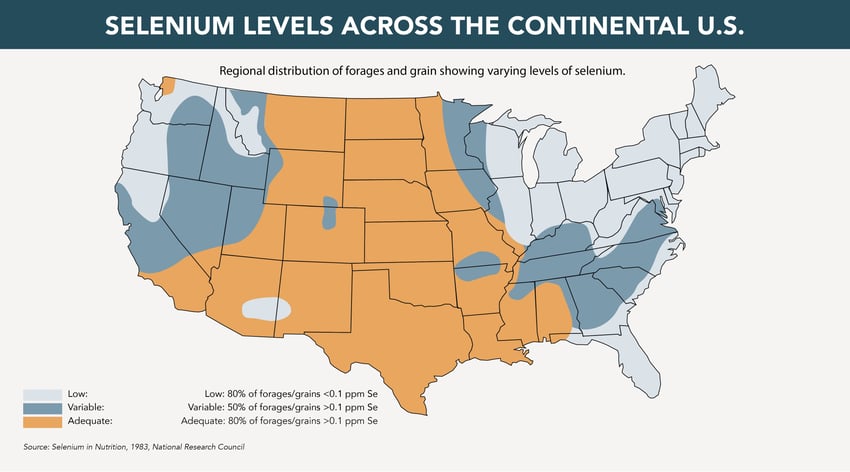When & How to Supplement Selenium for Horses
June 29, 2023
When & How to Supplement Selenium for Horses
Selenium is an essential trace mineral all animals need to survive and thrive. It provides critical support to immune and cellular health in horses. However, this vital mineral also operates on a delicate balance within the body. Selenium is required in trace amounts only, and over-supplementation can lead to toxicity.
Do you have questions about when and how to safely supplement selenium in horses? We have info to help you pinpoint both how much your horse is receiving and needs to strike the right balance and provide valuable health benefits. Let's learn about selenium and equip you to start a supplementation program that fosters health in your equine companion.
What is Selenium?
Selenium is a metalloid mineral found in the Earth’s soil and groundwater. From there, selenium enters the food web by being absorbed by plants and then ingested by animals.
Selenium is a trace mineral, meaning it is needed in small quantities. When eaten in the right amounts, dietary selenium has many proven health advantages. Let’s explore some of the crucial selenium benefits for horses.
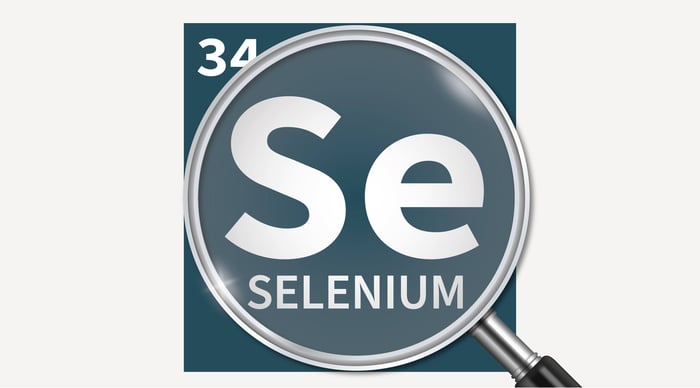
What Does Selenium Do for Horses?
While the amount of selenium a horse requires is tiny, its impact on the body is significant. It plays a critical role in promoting healthy thyroid function, reproduction, and equine muscle development.
Selenium possesses another remarkable quality—it acts as an antioxidant. Let’s take a closer look at selenium’s unique antioxidant role and how it bolsters the immune system, then touch on its synergistic partnership with vitamin E.
The Synergistic Role of Vitamin E and Selenium in Horses
Together, selenium and vitamin E form a harmonious and powerful duo. These complementary antioxidants work in tandem to safeguard cells and tissues from oxidative damage. They also support overall immune health. We'll briefly cover these two important functions.
Oxidative Stress
The body is constantly turning molecules of food, water, and air into chemical energy to power itself. As these molecules are broken apart and metabolized for energy, pairs of electrons are broken apart as well. Molecules with unpaired electrons search the body, seeking out another electron to complete itself. These molecules are known as free radicals.
Free radicals are normal byproducts but can build up to harmful levels and damage healthy cells in their quest for electrons. Oxidative stress occurs when too many free radicals are causing cellular damage. A body in oxidative stress is at higher risk for viral infections, inflammatory diseases, cancers, and other degenerative diseases.
Antioxidants & Selenoproteins
Antioxidants, like selenium and vitamin E, keep excess free radicals in check and protect cells from oxidative stress. They accomplish this by neutralizing free radicals with the electron they need.
Once ingested, dietary selenium also becomes incorporated into at least 25 different proteins. These selenoproteins regulate the immune system and prevent it from harmfully overreacting.
According to the National Institute of Health: “Dietary selenium (Se), mainly through its incorporation into selenoproteins, plays an important role in inflammation and immunity. Adequate levels of Se are important for initiating immunity, but they are also involved in regulating excessive immune responses and chronic inflammation.”
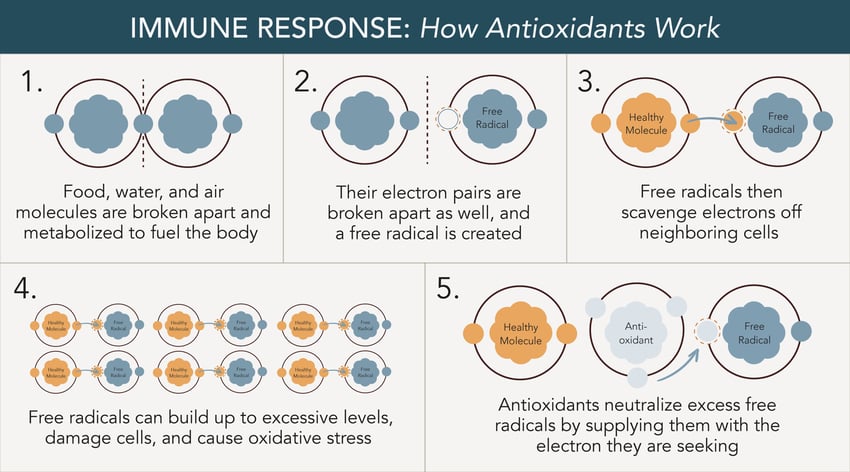
How Much Selenium Does a Horse Need?
Given the delicate balance of selenium the equine body operates on, it’s important to properly nail down the amount horses need. We have good guidelines to help us do that.
According to the National Research Council (1989), the minimum selenium requirement for an average 1,100-pound horse is set at 1 mg per day, with a maximum intake of 2 mg. While 1 mg/day is sufficient to prevent obvious signs of deficiency in idle horses, it likely won’t support optimal health and performance in active horses.
Alternatively, the Food and Drug Administration (FDA) recommends an average intake of 3 mg per day for most horses.
Considering information from both sources and taking into account your horse’s work intensity and weight, daily selenium intake should reasonably range from 2 to 3 mg per day. Consult with your veterinarian for tailored recommendations.
Selenium Toxicity in Horses
As mentioned, selenium is essential for life but only required in trace amounts. Fortunately, severe toxicity or death in horses from excessive selenium intake is rare. Instead, toxicity is more often a chronic condition caused by consuming feeds grown in selenium-rich soils.
The American Association of Equine Practitioners notes these symptoms of horse selenium toxicity:
- Mane and tail hair loss
- Cracked hooves
- Signs of lameness
- Excess salivation
Signs of severe selenium overdose may include:
- Staggering gait
- Blindness
- Labored breathing
- Respiratory failure
- Muscle tremors
- Collapse
Selenium Deficiency in Horses
In the U.S, it is more common for horses to receive too little selenium than too much. This is largely due to the numerous regions producing selenium-deficient forage. Notably, young, fast-growing foals are particularly vulnerable to selenium deficiency, which can lead to a condition called white muscle disease.
Symptoms of selenium deficiency in foals and adult horses include:
- Failure to thrive
- Delayed or reduced immune response to vaccination
- Decreased immune function
- Muscle weakness and wasting
- Impaired movement
- Difficulties with suckling or swallowing
- Coughing when eating
- Respiratory distress
- Impaired heart function
How to Start a Selenium Supplementation Program
You now understand more about the benefits and importance of selenium! Before you run out and buy an equine selenium supplement, however, there are a few more important things to be aware of and consider.
First, choose the right source. Selenium exists in two forms: organic (such as selenomethionine and selenocysteine) and inorganic (selenate and selenite). According to Oregon State University, animals that consume organic selenium retain more of it with fewer concerns of toxicity. Conversely, inorganic forms offer short-term results, with selenium levels maintaining for less than one month.
Second, it is important to note that many feeds and forages naturally contain varying amounts of selenium. So, before scooping selenium into your horse’s feed bucket, consider these guidelines to assess your horse's current intake and determine if additional supplementation is necessary:
- Test your soil selenium levels. Contact your area’s local cooperative ag extension for help testing your soil.
- Test feed and forage. Use the cooperative ag extension link above for help testing feed/forage. Check this interactive map from the U.S. Geological Survey and note if your feed was grown in a selenium-poor area.
- Read supplement labels. Calculate selenium in supplements to determine how much is contributing to your horse’s overall diet.
- Test horse selenium levels. Consult your veterinarian to conduct a blood test, liver biopsy, or take a milk sample in the case of a lactating animal.
- Introduce a suitable supplement. Opt for a product with organic selenium. Follow the recommended feed ratios and monitor your equine for results.
By following these steps, you can ensure your horse receives the appropriate amount of selenium for optimal health while minimizing the risk of over-supplementation.
Redmond Daily Red Fortified: Natural Selenium Supplement for Horses
At Redmond, we love sharing the richness of our ancient mineral deposit in Utah, USA, with horses everywhere. Daily Red Fortified, our balanced, nature-made mineral salt helps horses thrive and improves body condition.
- 60+ natural, mined trace minerals
- Boosted vitamin and mineral formula
- Excellent source of organic selenium for horses
- Excellent source of natural vitamin E
- Available in loose granules for easy feeding
- No hassle, love-it-or-return-it guarantee
With Daily Red Fortified, you’ll feel good knowing your partner is receiving a premium selenium horse supplement that harnesses the power of nature to promote optimal health and performance. Click below to learn more and purchase today.
Learn More
- Discover the most common equine nutrient deficiencies and how Daily Red Fortified can help bring balance.
- How much iron for horses is too much? Learn how much iron is in typical horse forage and Redmond Rock.
© Redmond Equine 2023. All rights reserved.
Related posts
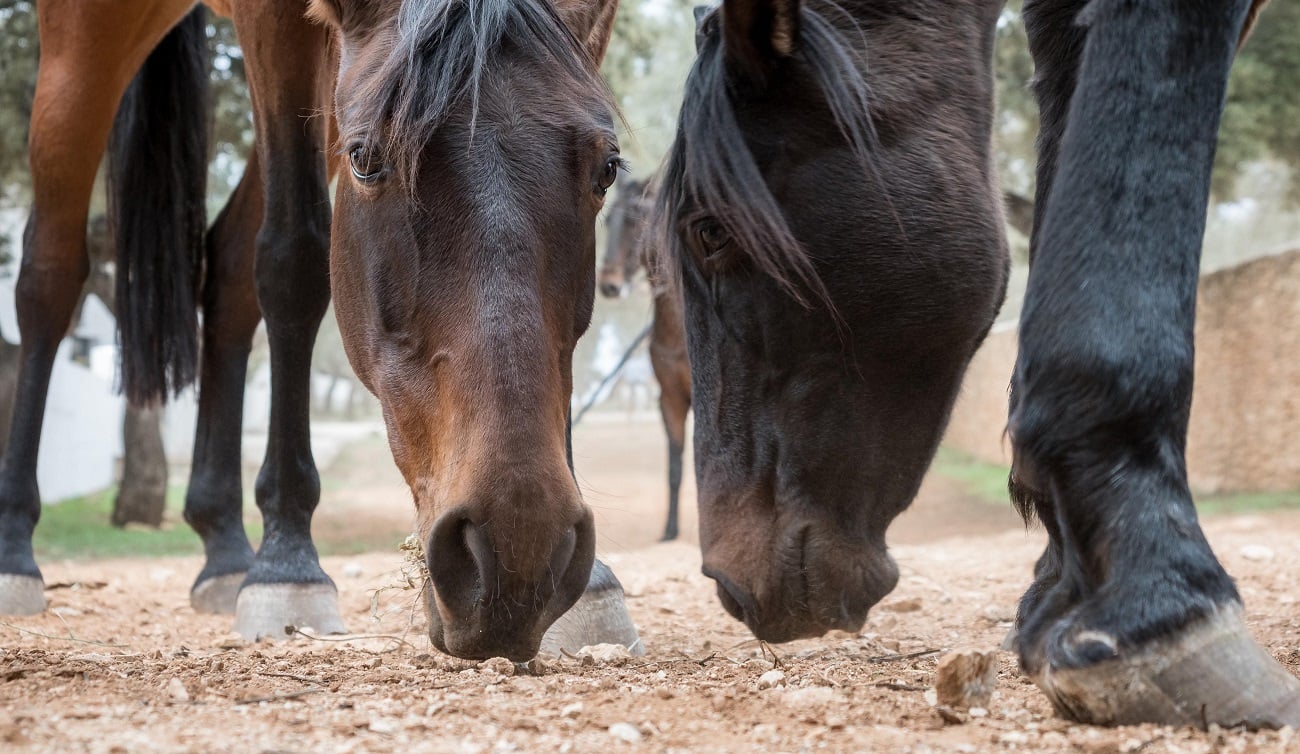
5 Reasons Horses Eat Dirt (and What to Do About It)
Sometimes I see my horse eating dirt. In moderation, dirt is beneficial for your horse. Here are 6 reasons why horses eat dirt, also known as...
December 18, 2024
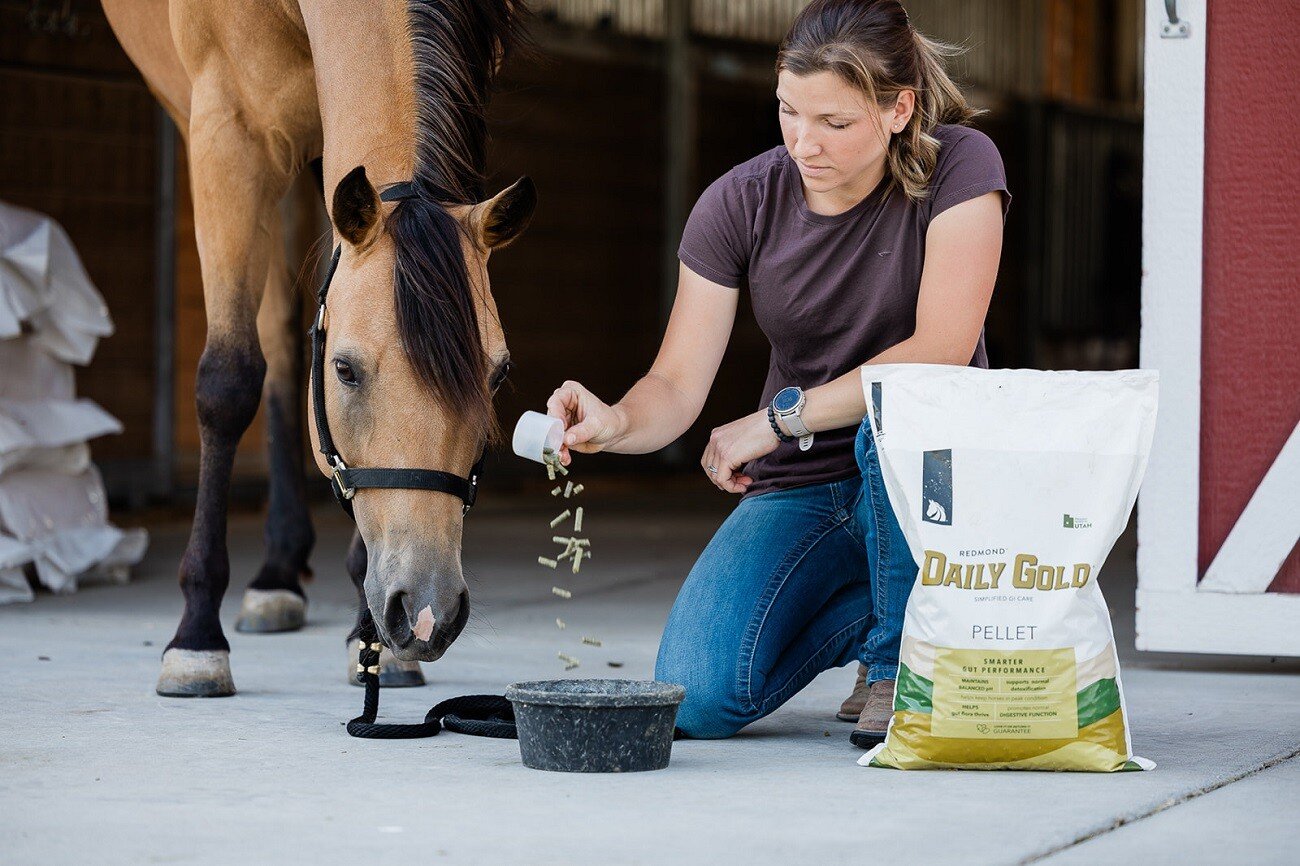
Natural Horse Digestive Supplement | Redmond Daily Gold Pellets
Looking for effective digestive supplements for horses? Redmond Daily Gold pellets offer natural gastric support for horses in an easy-feed gut...



